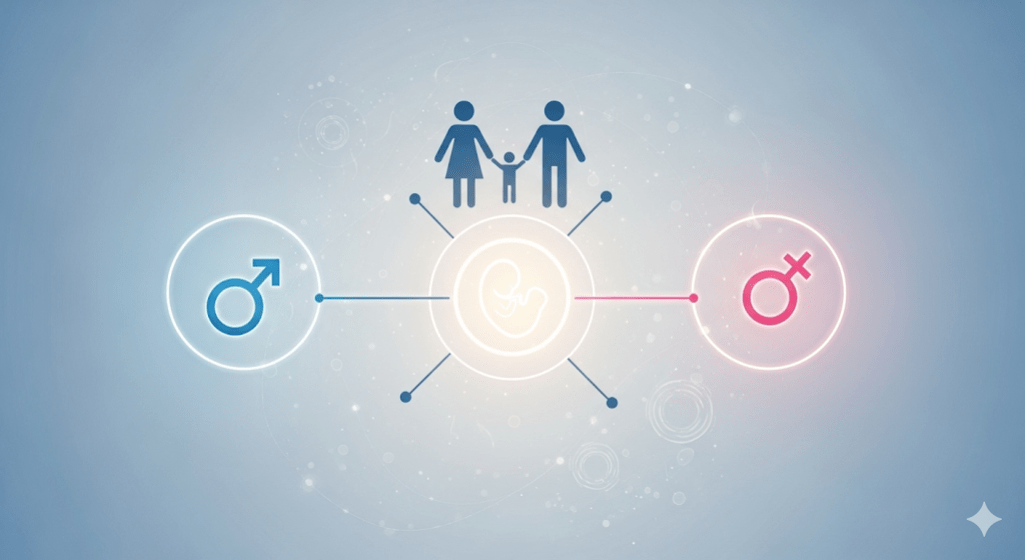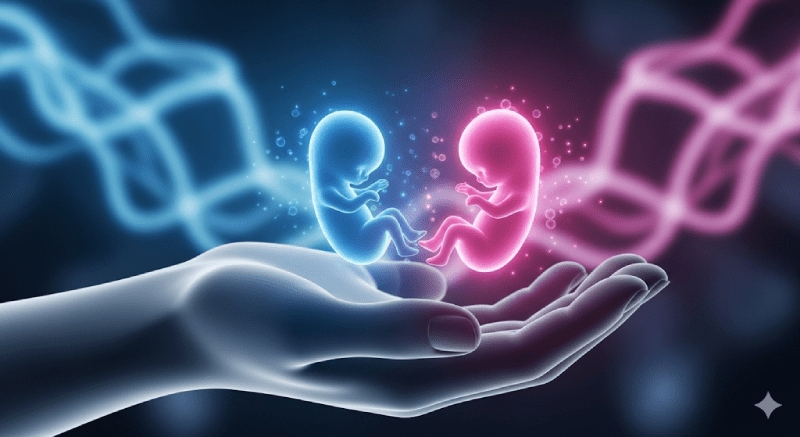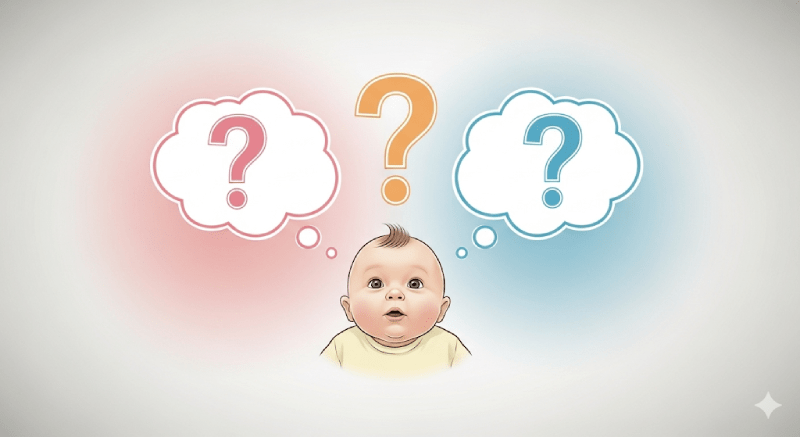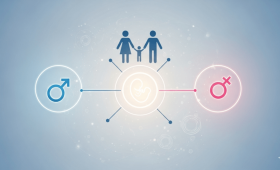Is Gender Selection Legal Using In Vitro Fertilization (IVF) in Japan
IVF procedures in Japan are governed by strict rules and guidelines established by the Japan Society of Obstetrics and Gynecology (JSOG). These guidelines absolutely prohibit gender selection unless there is a critical medical necessity, such as preventing the transmission of sex-linked genetic diseases. Therefore, performing IVF gender selection for non-medical reasons, such as social preference or family balancing, is not a legally permitted practice in Japan. Any institution that violates this rule risks losing its license. This strict restriction stems from a concern for preserving ethical and social balance, and exceptions are only granted for vital medical conditions.
What Are JSOG’s Guidelines Regarding Gender Selection
The Japan Society of Obstetrics and Gynecology (JSOG) is the most authoritative body for reproductive medicine practices in the country and has very clear and restrictive guidelines on gender selection. Under the Medical Guidelines for Gender Selection, JSOG permits the use of preimplantation genetic testing (PGT) or other techniques only for the purpose of preventing the transmission of sex-linked hereditary diseases (e.g., hemophilia) to the child. Otherwise, requests for gender determination based on family preference, balancing desire, or social reasons are strictly rejected. These guidelines form the foundation of reproductive medicine ethics in Japan, and clinics are obliged to adhere to these rules.
Under Which Circumstances Is PGT Application Permitted in Japan
PGT (Preimplantation Genetic Testing) is permitted in Japan to detect the presence of a genetic disease in the embryo and select healthy embryos for transfer. PGT-M (for monogenic/single-gene disorders) and PGT-A (for aneuploidy/chromosome number abnormalities) are typically approved only when the couple is known to be a hereditary genetic risk carrier or for specific medical indications like recurrent pregnancy loss. Gender selection, however, can only be performed as a byproduct of PGT in cases where the embryo’s sex puts it at risk of a fatal or severe illness (sex-linked diseases); it can never be the primary goal.
How Is Medically Indicated Gender Selection Defined
Medically indicated gender selection is valid in situations where the birth of a child of a specific sex will prevent a genetic or hereditary disease linked to that sex. These diseases are often carried on the X chromosome and are more severe in male children (e.g., hemophilia or Duchenne Muscular Dystrophy). In these cases, it is medically acceptable to use PGT before embryo transfer to select and transfer only embryos of the sex that are not carriers or have a low risk of the disease. This is considered a protective medical intervention rather than an ethical obligation.
Do Legal Restrictions Direct Couples Towards Overseas Treatment
Due to the strict legal and ethical restrictions in Japan, couples who wish to undergo gender selection for non-medical reasons (such as family balancing) are inevitably directed toward overseas reproductive health centers. Couples unable to access this service in Japan begin searching for treatment options in countries where such procedures are legal and more accessible. This situation has significantly increased the popularity of IVF clinics in countries that offer high-standard healthcare and permit gender selection. Overseas treatment provides couples with access to this specialized procedure that is unavailable in Japan.
How Do Clinics in Japan Approach Gender Determination Requests
Clinics in Japan must strictly comply with the Medical Guidelines for Gender Selection. When a couple requests gender determination, clinics first meticulously assess whether the request stems from a medical necessity. If the request is based on a non-medical reason (family balance or personal preference), the clinic authorities are obligated to strictly reject it. Clinics inform couples about the JSOG’s ethical rules and the legal restrictions in the country. They may discuss the PGT process if there’s a genetic disease risk, but they will take no steps towards social gender selection.
What Are the Core Benefits of PGT Beyond Gender Selection
Preimplantation Genetic Testing (PGT) is a critical technology that allows for the genetic evaluation of the embryo before transfer to the uterus, and its core benefits extend beyond gender selection. PGT aims to reduce the risk of recurrent pregnancy loss, failed IVF cycles, and genetic disease carriage by detecting chromosomal abnormalities (PGT-A) and specific genetic diseases (PGT-M). This significantly increases the chance of a healthy pregnancy and birth. PGT is accepted in Japan, with specific medical indications, as a tool to enhance the success of the IVF process and minimize genetic risks.

Why Does Gender Selection Lead to Ethical Debates
Gender selection, when performed outside of medical necessity (for social or personal preferences), is a globally controversial application leading to serious ethical debates. At the heart of these discussions is the belief that the practice could fuel gender discrimination, lead to societal gender imbalances, and that the idea of “designing” a child simply to possess a desired sex is an undue interference with the natural process. Countries like Japan respond to these ethical concerns by prohibiting non-medical gender selection to protect their societal values and balance.
What is the Stance of the Japanese Government on This Issue
The Japanese government heavily relies on and supports the guidelines of professional organizations like the Japan Society of Obstetrics and Gynecology (JSOG) in regulating reproductive medical practices. The government’s general stance is that reproductive health technologies should only be used for medical purposes and within ethical boundaries. While there is no specific legislation, clinics that violate JSOG’s prohibitive rule can face severe administrative sanctions. This indicates that the government endorses the ethical and scientific authority of the JSOG and implicitly adopts an opposition to social gender selection.
Is Undergoing Gender Selection Overseas Legal for Japanese Citizens
It is generally not a violation of their home country’s laws for Japanese citizens to undergo a medical procedure that is illegal in Japan, in another country where it is legal. Thus, a Japanese citizen undergoing gender selection abroad does not violate the legal regulations within Japan’s borders. However, some legal and ethical restrictions might continue regarding the use of medical records or information related to this process after returning to Japan. Couples should pay attention to the legal regulations of the country they travel to and the ethical consequences of the procedure. Intermediary agencies like Cure Holiday can provide guidance in this process.
What is the Primary Goal of Gender Selection Prohibitions
The primary goal of gender selection prohibitions is to prevent the misuse of reproductive technologies and to maintain the natural flow of the social gender balance. In the context of Japan, these prohibitions place the need to protect the general society and ethical values above the right of individuals to determine the sex of their children based on non-medical preferences. The ban prioritizes the child’s health and protection from genetic diseases over parental choice. Furthermore, it aims to prevent the risk of preferential abortion that could potentially lead to societal gender imbalances.
What Examples Can Explain Sex-Linked Diseases
Sex-linked diseases are genetic conditions typically carried on the X chromosome and are therefore more common or severe in one sex (mostly male). Common examples of these diseases include hemophilia, which affects blood clotting, and Duchenne Muscular Dystrophy (DMD), which leads to progressive muscle weakness. For couples who are known carriers of such diseases, PGT with gender selection (exclusion of the at-risk sex) in Japan is the only medically and ethically acceptable exception to ensure the healthy birth of a child.
Have Legal Restrictions Increased IVF Tourism
The strict gender selection prohibitions in Japan have significantly increased IVF tourism among couples seeking this procedure. Couples who cannot find the means for non-medical gender determination in their home country prefer to travel to countries that offer high-quality reproductive health services and where the procedure is legal. This situation has created a market for international fertility clinics and medical tourism agencies outside of Japan. For these couples, consulting services like Cure Holiday, which organize the treatment process, serve as an important bridge to overcome legal barriers.
Can Gender Selection Be Performed with Non-PGT Methods in Japan
The use of methods other than PGT (Preimplantation Genetic Testing) for gender selection in Japan (e.g., Sperm Washing/Separation, Ericsson Method) is similarly prohibited. JSOG’s ethical guidelines cover and restrict all forms of attempts at non-medical gender determination. This means that even less invasive or older techniques are not permitted for social purposes. Therefore, regardless of the technology used, all IVF centers and reproductive health clinics in Japan can only determine gender for the purpose of eliminating genetic disease risk.
Why Is the Request for Family Balancing Rejected
The request for family balancing (e.g., a family with two boys wanting a girl) is not accepted as a medical justification for gender selection in Japan and is strictly rejected. Legal regulations stipulate that the decision to have a child must be based on vital medical necessities, such as preventing the risk of genetic diseases. Social or psychological reasons like family balancing are not considered strong enough medical indications to justify determining a child’s sex in a laboratory setting. This rejection is based on concerns for protecting gender equality and ethical principles.
Can Legal Regulations Change Over Time
The legal regulations and JSOG guidelines related to IVF gender selection in Japan may be updated from time to time based on scientific advancements, ethical debates, and social changes. However, the prohibition on non-medical gender selection remains a strict, long-standing rule for decades. Any changes, should they occur, would typically happen through a slow and meticulous process, as reproductive medicine applications require high ethical sensitivity. It is mandatory for couples to check the current legal status and comply with existing restrictions.
What Are the Societal Reasons for Prohibiting Gender Selection
The societal reasons behind the prohibition of gender selection reflect the value Japan traditionally places on balance and harmony. The widespread preference for a specific sex in society could potentially lead to gender ratio imbalances and create negative effects on issues like women’s rights. The primary goal of the ban is to prevent reproductive technologies from becoming a tool for discrimination that could disrupt existing social norms. This stance is based on the belief that the natural determination of a child’s sex is ethically and socially more acceptable.
Why is Consulting Service Important in Overseas Treatment Processes
Consulting services are vitally important for couples who cannot perform gender selection in Japan and seek overseas treatment. Professional consulting firms like Cure Holiday help couples select reliable clinics in countries with different legal procedures, make travel and accommodation arrangements, and manage the logistics of the treatment process. These services provide significant assurance in overcoming language barriers, understanding diverse legal requirements, and ensuring the entire process proceeds stress-free and smoothly.
Can Gender Selection Be Guaranteed One Hundred Percent with PGT
While gender selection performed with PGT (Preimplantation Genetic Testing) has an extremely high accuracy rate (over 99%), no medical procedure offers a one-hundred percent guarantee. PGT analyzes the embryo’s genetic material to determine the sex and only transfers embryos of the desired sex. However, processes such as the transferred embryo implanting in the uterus and the continuation of a healthy pregnancy always carry natural risks. Therefore, although the birth of the PGT-selected gender is almost certain, the success of the pregnancy cannot be guaranteed.
How Does the Cost of IVF Treatment Change with Gender Selection
The standard cost of IVF treatment usually increases with the addition of the gender selection procedure. Gender selection necessitates the PGT (Preimplantation Genetic Testing) laboratory process. This process includes taking a biopsy from the embryo, performing genetic analysis, and selecting embryos based on these analysis results. Therefore, the high cost of PGT is added to the total cost of the IVF cycle. Since non-medical gender selection is not performed in Japan, this additional cost is a factor encountered in overseas treatments.
What Psychological Challenges Do Couples Facing Gender Selection Encounter
Couples deciding on gender selection may face serious psychological difficulties due to ethical dilemmas, fear of social judgment, and the possibility of the procedure failing. The necessity of traveling abroad due to legal restrictions in Japan further heightens this stress. This process can be characterized by uncertainty, feelings of guilt, and anxiety. It is important for couples to seek professional counseling and psychological support to manage this difficult emotional process and cope with the outcomes of their decisions in a healthier way.

Are There Penalties for Performing Illegal Gender Selection in Japan
The application of non-medical gender selection in Japan is not treated as a direct violation of criminal law, but rather as a violation of the Japan Society of Obstetrics and Gynecology (JSOG) guidelines. A clinic or practitioner who fails to comply with these guidelines may face sanctions such as license cancellation, suspension, or severe administrative fines. That is, the penalty is directed not at the couples, but at the healthcare facilities performing the non-compliant procedure. Therefore, no clinic willing to take such risks can legally offer this procedure in Japan.
In Which Countries Are Gender Selection Bans More Flexible
Gender selection prohibitions vary greatly worldwide. In contrast to Japan’s strict ban, in countries like Thailand, the Turkish Republic of Northern Cyprus, some states in the United States, and Mexico, non-medical gender selection (for family balancing or personal preference) is generally legal or subject to more flexible regulations. These countries form the main routes for medical tourism patients coming from Japan for this procedure. Cure Holiday is experienced in directing couples to reliable centers in these countries.
How Is Embryo Development Monitored in IVF
During the IVF process, embryo development is meticulously monitored in the embryology laboratory. After the egg and sperm are fertilized, the resulting embryos are typically observed for 5 to 6 days in a culture medium. Embryologists evaluate the embryos’ cleavage rate, cell count, and quality daily under a microscope. If PGT is to be performed, a biopsy is usually taken from the outer cell layer (trophectoderm) when the embryo reaches the blastocyst stage, around the 5th or 6th day. This monitoring ensures that the highest quality and genetically healthy embryos are selected for transfer.
At What Stage Is PGT Applied for Gender Selection
Gender selection (even with a medical indication) requires PGT to be applied typically at the blastocyst stage of embryo development, which is the 5th or 6th day after fertilization. At this stage, a few cell samples are taken from the outer layer of the embryo (trophectoderm). These cells are sent to a genetic laboratory to determine the embryo’s chromosomal structure and sex. The reason for performing the biopsy at this stage is that the risk of damaging the inner cell mass (the part that will form the fetus) is minimal, and the analysis can be performed with high accuracy.
What Is the Only Gender Selection Technique Permitted in Japan
The only gender selection technique permitted in Japan for medical reasons (risk of sex-linked genetic disease) is the determination of sex as part of PGT-M (Preimplantation Genetic Testing for Monogenic Diseases). In this process, the embryo’s sex is determined simultaneously with checking whether it carries a genetic disease. Due to legal restrictions, only the exclusion of the sex at risk of carrying the genetic disease and the transfer of healthy embryos is accepted. Using PGT or any other technique solely for gender determination is legally prohibited.
What Should Be Considered When Choosing Overseas Clinics
Couples seeking gender selection treatment abroad must consider several critical points when choosing a clinic. Firstly, they must ensure that the procedure is legal in the country where the clinic is located and that the clinic has international accreditations. The clinic’s success rates, the technology used, the experience of the embryologists, and particularly their expertise in advanced genetic testing processes like PGT/PGT-A/PGT-M should be questioned. Intermediary agencies like Cure Holiday can assist couples in this complex evaluation process by providing reliable and transparent information to choose the right clinic.
What is Cure Holiday’s Role in the Medical Tourism Process
Cure Holiday offers comprehensive medical tourism consulting services for couples in Japan who cannot access gender selection treatment due to legal obstacles. Their role begins with recommending international reproductive health centers where the procedure is legal and which have high success rates. They then manage all logistical processes, including travel arrangements, accommodation, scheduling clinic appointments, translation services, and coordinating post-treatment follow-up. Cure Holiday aims to provide a safe, ethical, and seamless treatment experience for couples during this sensitive and complex process.
Is There a Risk of PGT Harming the Embryo
Taking a cell sample (biopsy) from the embryo during PGT (Preimplantation Genetic Testing) is a low-risk procedure, but this risk is minimal when performed by experienced embryologists. Since the biopsy is usually taken at the blastocyst stage (5th or 6th day embryo) from the outer cell layer (trophectoderm), which will not form the fetus, it does not significantly affect the embryo’s developmental potential. Thanks to modern laboratory techniques and freezing methods, the potential negative effects of PGT on embryo health have been largely reduced, although the risk is not entirely zero.
How Are Language Barriers Overcome in Overseas Treatments
The language barrier can be one of the biggest challenges couples face in overseas IVF and gender selection treatments. To overcome this barrier, medical tourism companies like Cure Holiday generally provide medical interpreters or coordinators who speak the couple’s native language. These individuals ensure accurate and complete communication between the clinic staff and the couple, preventing misunderstandings and treatment errors. Furthermore, the translation of written documents and medical forms is included in the service. This support allows couples to follow their treatment processes with confidence and ease.
How Is the Success Rate of Gender Selection Related to PGT
The success rate of the gender selection procedure is directly related to the reliability of PGT (Preimplantation Genetic Testing) technology. PGT can determine the embryo’s sex with near 100% accuracy. However, the ultimate success of the procedure (i.e., a live birth) depends on the selected embryo’s success in implanting in the uterus and establishing a healthy pregnancy. This success rate varies depending on the woman’s age, embryo quality, and the general success statistics of the IVF center used. Even though gender determination is accurate, the success of the pregnancy cannot be guaranteed.
Are There Age Restrictions in the IVF Process in Japan
There is no definitive upper age limit legally established for accessing IVF treatment in Japan. However, the Japan Society of Obstetrics and Gynecology (JSOG) strongly advises detailed counseling and information be provided to women aged 43 and older before starting IVF treatment. Many clinics may limit or entirely refuse treatment to patients aged 45 and over based on their own ethical rules, due to decreased success rates and increased pregnancy risks. The gender selection ban applies to all couples regardless of age restrictions.
What is the Difference Between PGT-A and PGT-M
The difference between PGT-A (Preimplantation Genetic Screening-Aneuploidy) and PGT-M (Preimplantation Genetic Testing-Monogenic) lies in the type of genetic problem analyzed. PGT-A checks whether the embryo’s chromosome count is abnormal (e.g., Down Syndrome). PGT-M, on the other hand, searches the embryo for single-gene disorders (e.g., cystic fibrosis or hemophilia) that the couple is specifically known to carry. In Japan, PGT-M is used as a tool to prevent sex-linked diseases, while PGT-A is applied with specific indications to increase the general IVF success rate.

Should Couples Who Undergo Gender Selection Disclose This to Their Children
Whether couples who have undergone gender selection should disclose this information to their children is a complex ethical issue dependent on personal, cultural, and family values. Due to the illegality of the procedure in Japan, couples who undergo treatment abroad might prefer to keep this information private. Experts often suggest that sharing this information openly and honestly as the child grows older might be healthier for building a trusting relationship. However, the method and timing of this disclosure are highly sensitive issues solely at the family’s discretion.
What Preparations Should Be Made Before IVF Treatment
Comprehensive preparations, both physical and psychological, should be made before IVF treatment. For the woman, detailed hormonal tests, ultrasounds to evaluate ovarian reserve, and uterine health are checked. For the man, a sperm analysis is performed. It is recommended that the couple adopt a healthy lifestyle, quit smoking and alcohol, eat a balanced diet, and reach an ideal body weight. In the case of overseas treatment, logistical preparations such as gathering all medical records and preparing travel documents are also of great importance.
What Are the Ethical Justifications for Not Applying Gender Selection in Japan
The main ethical justification for not applying gender selection in Japan is to prevent reproductive technology from becoming a tool for “designer babies.” This ban is based on the belief that a child’s sex should be a natural chance event, that parental preferences should not overshadow the child’s existence, and that it harbors the potential to increase gender discrimination in society. Ethical rules aim to limit the purpose of reproductive medicine to treating infertility and preventing genetic diseases, not serving social selection.
Do Overseas Clinics Comply with Japanese Standards
The compliance of overseas IVF centers with Japanese health standards varies depending on the clinics and countries. However, international consulting firms like Cure Holiday direct couples, who are accustomed to high standards in Japan, to clinics with international accreditation (like JCI, ISO), proven success rates, and modern laboratories in the US, Europe, or other regions. This way, the service quality received by couples is aimed to meet or exceed expectations in Japan, although the legal regulations will differ.
What Are the Procedures for Embryo Storage After Gender Selection
After gender selection (with PGT), while the embryos of the selected sex are used for transfer, the remaining genetically healthy embryos of the different sex are usually frozen and stored. Japan has specific restrictions and guidelines for the duration of embryo storage. Couples must give prior consent regarding the future use or disposal of frozen embryos. For treatments performed abroad, storage rules are subject to that country’s legal regulations, so it is important for couples to learn these details through Cure Holiday.
Does the Gender Selection Ban Include Egg Donation
The gender selection ban in Japan covers all forms of non-medical gender determination attempts in the IVF process, but the egg donation procedure itself is a separate ethical and legal debate. In Japan, egg donation is discussed only in very specific and narrow medical situations (e.g., premature menopause) and usually among close relatives, within the strict ethical rules of JSOG. Even in an IVF cycle involving egg donation, gender selection is still limited to medical necessity and is prohibited for social preference.
Why Are Communication and Transparency Important in the Treatment Process
Communication and transparency are vital in complex and ethically sensitive treatment processes like IVF and especially gender selection. Open communication between the couple, the clinic, and the intermediary agency (e.g., Cure Holiday) at every stage helps eliminate potential misunderstandings, differences in expectations, and legal/ethical uncertainties regarding the treatment. Receiving full and accurate information about all procedures, risks, costs, and legal status allows couples to give informed consent and conduct the entire process with confidence.
What Is the Effect of PGT Results on Embryo Quality
The PGT (Preimplantation Genetic Testing) procedure itself, when performed in experienced hands and with modern techniques, does not negatively affect embryo quality. On the contrary, PGT-A application increases the quality and implantation potential of embryos transferred to the uterus by allowing the selection of embryos that are chromosomally normal. This increases the chance of a healthy pregnancy. Since the purpose of PGT is to select the best available embryos, it helps maximize the chance of a live birth rather than adversely affecting embryo quality.
What Kind of Medical Documentation Is Required for Gender Selection
In the rare medical situations in Japan where gender selection is permitted (sex-linked genetic diseases), the required medical documentation is extremely comprehensive and meticulous. Genetic test results of the couple and family members, reports confirming the definitive diagnosis of the disease, and genetic counseling reports verifying the disease’s link to gender must be submitted. These documents are used to support the application to the JSOG ethics committee or relevant units and prove that the procedure is only permitted for the purpose of disease prevention.
What Is the Population Impact of Not Performing Gender Selection in Japan
The prohibition of non-medical gender selection in Japan helps the country’s birth gender ratios remain naturally balanced. In some countries, legal loopholes or free practices can lead to the concentration of male or female preference, causing imbalances at the population level. Japan’s strict rule aims to prevent such a social problem from arising in the first place and contributes to the preservation of the natural gender ratio.
What Factors Increase Pregnancy Success in IVF Treatment
Numerous factors affect pregnancy success in IVF treatment. The most important factors include the woman’s age (younger age, higher success), embryo quality (especially embryos proven to be genetically normal with PGT), uterine health, the application of the correct protocol, and the center’s laboratory standards. The couple’s overall health status, such as a healthy lifestyle, stress management, and nutrition, also indirectly influences success.
How Long Does the Gender Selection Procedure Take
The gender selection procedure occurs as an integral part of a standard IVF cycle and is not a duration measured on its own. The treatment involves a 2-3 week process covering ovarian stimulation, egg retrieval, and fertilization stages. After the embryos reach the blastocyst stage (5-6 days), a biopsy sample is taken for PGT (gender selection), and genetic analysis typically takes 7-14 days. During this analysis period, the embryos are frozen, and the transfer is planned after the results are received, meaning the total process can span 1.5 – 2 months.
Can Post-Overseas Treatment Follow-up Be Done in Japan
Couples who undergo gender selection or IVF treatment abroad can have their pregnancy follow-up done seamlessly at a local healthcare facility upon returning to Japan. Pregnancy monitoring is accepted as a standard pregnancy process, and the legality of the overseas procedure does not hinder this follow-up. The important thing is that all medical records, embryo reports, and genetic diagnosis results obtained from the overseas clinic are organized and legible. These records are critically important for doctors in Japan to fully understand and correctly manage the pregnancy process.
What is the Societal View on Non-Medical Gender Selection in Japan
The societal view on non-medical gender selection in Japan generally parallels the strict ethical stance of professional organizations (JSOG). There is a strong consensus in the public that reproductive technologies should only be used to solve medical problems and prevent genetic diseases. Many people find gender determination requests unethical due to the interference with the child’s natural right to be born and the potential risk of creating societal gender imbalance. Therefore, this practice is not widely accepted in Japan, and privacy is often preferred in this matter.
What Are the Most Suitable Overseas Options for Gender Selection
The most suitable overseas options for couples who cannot perform gender selection in Japan are countries with centers where the procedure is legal, have high success rates, and offer services at international standards. Prominent locations generally include the United States, Thailand, the Turkish Republic of Northern Cyprus, and some European countries. These countries have advanced PGT technologies, experienced specialists, and the necessary infrastructure for medical tourism. Cure Holiday offers bespoke options to couples by providing access to reliable and legal centers in these countries.

Which Legal Procedures Are Eased by Cure Holiday’s Guidance
For couples traveling abroad through Cure Holiday, overcoming legal procedures and logistical barriers is made easier. Cure Holiday ensures that couples understand the gender selection laws in the destination country and the legal forms required by that clinic in advance. They also provide guidance on legal and administrative processes such as visa requirements, international travel restrictions, and understanding treatment contracts. This service allows couples to focus solely on their treatment and not worry about legal uncertainties.
What Are the Alternatives If IVF Treatment Fails
In the event of a failed IVF treatment, couples can consider several alternative options. The first step is usually to analyze why the treatment failed (e.g., embryo quality, implantation issues). Alternatives include starting a new IVF cycle, trying a different stimulation protocol, applying PGT (genetic testing) (if not done previously), or considering more advanced reproductive technologies such as egg/sperm donation. Cure Holiday supports couples in finding the most suitable new treatment plan after a failure.
How Do the Bans in Japan Affect Medical Tourism
The strict bans on non-medical gender selection in Japan have significantly boosted medical tourism among Japanese citizens. Couples prefer to travel to other countries that offer high-quality health services to access this specialized service that they cannot receive in their home country. This situation fills a gap created by the inability of Japanese clinics to offer this procedure. Intermediary agencies like Cure Holiday meet this demand, ensuring the integration of Japanese couples into the international reproductive health market.
Why Is Consulting Essential for Couples Undergoing Gender Selection
Consulting is essential for couples deciding on the gender selection procedure due to both psychological and logistical reasons. Psychological counseling helps couples cope with ethical dilemmas, manage expectations, and handle the stress brought by the treatment. Logistical and medical consulting (e.g., provided by Cure Holiday) ensures that couples choose a reliable and legal clinic abroad, receive transparent information about all processes and costs, and are supported throughout the treatment. This support is a fundamental requirement for the process to proceed smoothly and consciously.
How Should Cost Calculation Be Done for Overseas Treatments
Cost calculation for overseas gender selection treatments should include not only IVF and PGT fees but also additional expenses. The calculation should include plane tickets, accommodation, medication costs (which can vary by country), interpretation services, and a budget allocated for potential complications. Cure Holiday assists with budget planning by providing couples with a transparent and detailed cost breakdown that includes the treatment plan, PGT and gender selection fees, and travel expenses.
Is There a Possibility of the Gender Selection Ban Being Lifted in the Future
The likelihood of the ban on non-medical gender selection being lifted in Japan in the near future appears low, considering the ethical and scientific views of the Japan Society of Obstetrics and Gynecology (JSOG). The ban is fundamentally based on deeply rooted ethical concerns, the desire to protect societal values, and the principle of maintaining gender balance. Although global developments are monitored, Japan’s stance on this issue is generally cautious and restrictive. However, scientific progress and social pressure could lead to rule updates in the long term.
Do the Clinics Referred by Cure Holiday Have International Accreditations
Cure Holiday places great importance on the quality and reliability of the overseas reproductive health centers they collaborate with. Therefore, they typically work with clinics that possess international accreditations (e.g., Joint Commission International – JCI) or meet the highest health standards of their respective countries. These accreditations indicate that the clinics comply with global standards in hygiene, safety, laboratory quality, and patient care. Couples can request the accreditation and success reports of the centers they are directed to through Cure Holiday.
What Are the Lifestyle Recommendations After IVF
Following IVF treatment and potential gender selection embryo transfer, specific lifestyle recommendations are offered to couples to increase the chance of a healthy pregnancy. It is important for women to avoid heavy physical activities, stay away from stress, and not use medication without doctor’s advice. Maintaining a balanced and nutritious diet, getting enough sleep, and regularly taking the doctor-recommended vitamin supplements (especially folic acid) are critically important. Receiving psychological support and staying positive during this period also contributes positively to the process.
Guidance for Overseas Treatment: Cure Holiday
International solutions are available for couples unable to access the gender selection procedure for non-medical reasons due to legal restrictions in Japan. Cure Holiday stands by you during this sensitive process, enabling you to reliably reach internationally accredited centers with legal gender selection and high success rates.
With Cure Holiday:
- You fully understand and manage the legal procedures.
- You are directed to world-class clinics using the most advanced PGT technologies.
- All your travel and accommodation arrangements are professionally planned.
- You receive continuous medical consultation and language support throughout your treatment.
Cure Holiday is ready to guide you with experience and transparency in the steps you take to achieve your desired family balance.



